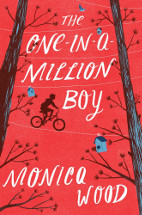The one in a million boy by Monica Wood

Headline, 2016. ISBN 9781472228369
An amusing and warm friendship develops between an eleven year old
boy scout and Miss Vitkus, a one hundred and four year old lady,
when he volunteers for yard work to earn a badge for service. The
lad's obsession with Guinness World records, his quirky outlook and
impeccable manners appeal to the woman who has no time for the
shallow time wasting of other well - wishers in her mature years.
The voice of the boy is never heard despite his interviews with the
woman about her long life experience which are recorded in chapters
for a school project. Clever authorship reveals the disarmingly
honest questions he asks by the style of the responses which the old
lady voices with equal honesty and candour.
For reasons revealed early in the book, Quinn, the lad's father
presents himself to Miss Vitkus to continue the yard work and odd
jobs on the boy's behalf until the end of the agreed period. The
boy's parents have been married and separated and Quinn has spent so
much time away from his family whilst touring in music bands that he
has become estranged from his son.
Guinness World records are important and recurring in the narrative.
By their nature they are superlative, yet the categories include the
mundane, the pointless and the ridiculous. One old lady's relatively
unremarkable life is shown to have had highs and lows of joy and
suffering (leading to hard earned wisdom) which are as meaningful to
her as that experienced by the most famous or accomplished
individual. Miss Vitkus' trust and friendship must be earned and
Quinn works hard in many senses to build a relationship with her,
partly to establish an emotional connection with his son who is only
ever referred to in the text as 'the boy'.
Regret, particularly due to inaction rather than mistakes presents
often in this story and characters in various situations are
revealed to agonise over whether failures may be amended and
disasters salvaged. Everyday decent people are the characters
playing out their lives in this book and I liked that the author
refrained from including unrealistic or uncommon elements which
would have detracted from readily identifiable normal life.
Whilst I did not find the tale particularly moving or captivating, I
suspect that it may be deeply meaningful to many.
Rob Welsh